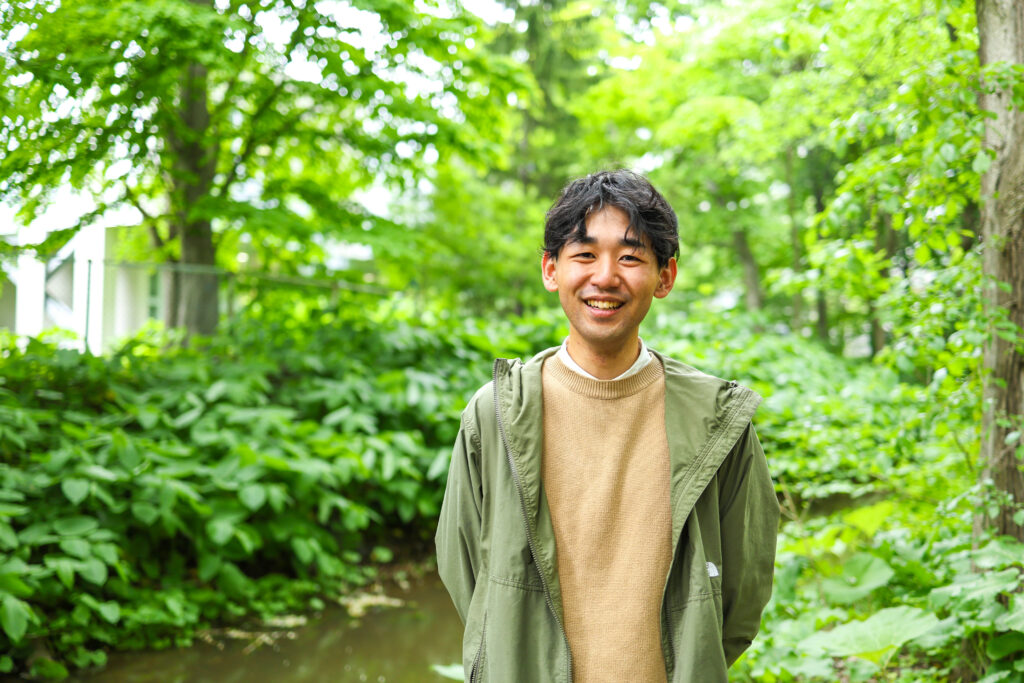This article was published in Japanese in Litterae Populi magazine (Autumn 2025, Vol. 75)
Forestry balances the forest cycle with economic sustainability. Sota Kojima, a third-year student in the School of Agriculture, wants to realize such an ideal forestry through barrel making. He established Michital Inc., which manufactures, sells, and maintains spirits barrels, forging ahead toward his envisioned future alongside like-minded peers. We spoke with him about his passion for this work and his future goals.

Sota Kojima
Born in Kyoto Prefecture, Kojima entered the School of Agriculture at Hokkaido University in 2023. He developed an interest in forestry through activities in the Hokkaido University Forestry Research Group and started a project to create spirits barrels using Hokkaido wood. He also won the grand prize at the JAL × Hokkaido University “Shine in the Northern Land Business Contest” in December 2024, and became the winner of the Hult Prize Hokkaido University on-Campus Program 2024-25 in February 2025. He established Michital Inc. in April 2025, serving as co-CEO alongside Naoaki Mizushima.
Tell us about your hometown, Kyoto.
I was born and raised in Kyoto. I grew up in a fairly urban area, but when I was in high school, the COVID-19 pandemic made it difficult to go out as I wanted. Craving fresh air, I started mountain climbing in the mountaineering club. I became completely hooked on mountains, and then when I joined the Forestry Research Group at Hokkaido University, I became fascinated with forestry.
What aspects of forestry attracted you?
I especially love lumber milling. Every time you cut boards from logs, different wood grain patterns appear, and there’s also something fascinating about the moment when a felled tree comes back to life as lumber. On the other hand, I felt frustrated learning that forestry, which is full of such appeal and creates wonderful value, isn’t properly valued economically.
Tell us how your barrel-making journey began.
During the summer of my 1st year, when I had a dilemma about forestry, I met Naoaki Mizushima, now a Chiiki Okoshi Kyoryokutai (local revitalization cooperator) in Furubira town and co-CEO of Michital Inc. He later became my partner in barrel making. Mizushima was involved in various activities, including forest management, and he also felt there were forestry issues. We had many conversations and agreed that we needed a powerful business that could balance the forest cycle with economic viability. That’s how we came to barrel making.
Currently, most spirits barrels used in Japan are made overseas. While there are barrels made from Hokkaido wood, they’re manufactured outside Hokkaido. Upon learning this, we wanted to complete the entire process in Hokkaido. By making barrels from Hokkaido wood and vinifying Hokkaido grapes in those barrels, we realized we could create fully Hokkaido-made wine. We thought that by offering tours where people could enjoy the pairing of that wine with Hokkaido’s renowned cuisine, we could create value that spans from primary to tertiary industries.
However, although we had a concept, we struggled to move to the next stage for quite some time. During this period, we applied to Hokudai Tech Garage, which provides manufacturing support for Hokkaido University students to develop products that don’t yet exist. There, we received advice to create a machine that makes barrels. “That’s it!” I thought. When I reached out to a technically skilled classmate, the circle expanded from there as more people joined us, and we quickly gained momentum in our shift toward technology-driven barrel making.
Tell us about the technology you developed.
We focused on the toasting and charring process. The degree of toasting and charring changes the wood’s aroma, which affects the flavor of the spirits. To create uniform products, we aimed to develop technology that could mechanically control this process, which tends to vary when done by hand. After numerous rounds of prototyping, we were able to use our prototype barrels for whiskey in December 2024.

What is your main role at Michital?
My partner, Mizushima, is very skilled at articulating ideas and can accurately express his vision of forestry in words. However, since his vision is somewhat abstract, I make it more understandable and concrete when communicating with our team. As they say, “God is in the details,” and I think it’s important for the entire team to share a common vision.
Please share your future goals and a message for current Hokkaido University students.
I want to add high value to lumber and create a breakthrough in the current forestry situation, where it’s hard to find a balance with economic viability. I want to first realize one successful case and change things from there.
I feel that Hokkaido has an environment where individuality is encouraged — a place where “the nail that sticks out” isn’t hammered down. While cherishing people around me and maintaining a humble attitude, I want to keep letting those nails stick out farther.
What’s important, I believe, is not to isolate ourselves with only students, but to actively engage with adults. Whether in research or extracurricular activities, I encourage you to go out and meet adults from the wider world.


